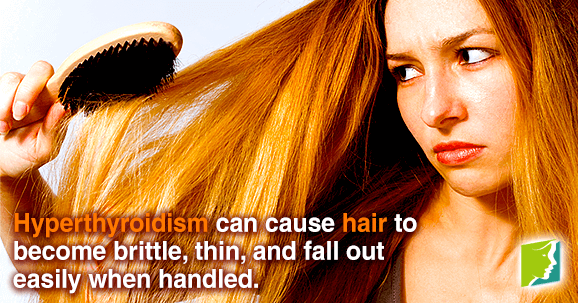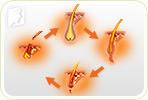Thyroid problems are common in menopausal women, as the gland is often affected by the hormonal changes during perimenopause. Thyroid disorders have a number of associated issues, including hair loss; hair may become thin, brittle, or fall out easily when the thyroid gland is not functioning healthily.
Understanding the Thyroid
The thyroid is the gland responsible for releasing T3 and T4 - the hormones that regulate the metabolism. Located beneath the Adam's apple, between where the collarbones meet, the thyroid is a significant gland in the endocrine system; when it does not function correctly, a number of resultant issues arise in the body.
Hyperthyroidism and Hair Loss
Hyperthyroidism refers to overactivity in the thyroid, when it produces excessive quantities of T3 and T4. This can cause a number of symptoms, including hair loss. Though the exact reason for this is not fully understood, an overactive thyroid can cause hair to become brittle, thin, and fall out easily when handled. This may result in small bald patches, but complete or near-baldness is rare.
Other symptoms of hyperthyroidism include:
- Excessive sweating
- Nervousness and restlessness
- Weight loss
- Increased appetite
- Frequent bowel movements
Hypothyroidism and Hair Loss
Hypothyroidism is the opposite of hyperthyroidism: hypothyroidism refers to an underactive thyroid. This is more common than hyperthyroidism and affects between 6 - 10% of menopausal women. Hypothyroidism is usually caused by thyroiditis - inflammation of the thyroid which damages the gland's cells and inhibits hormone production - derived from viruses, a weakened immune system, and pregnancy. As with an overactive thyroid, hypothyroidism causes hair loss, hair thinning, and brittle, breakable hair.
Other symptoms of hypothyroidism are:
- Fatigue
- Weakness
- Weight gain
- Muscle pain
- Constipation
- Irregular periods
Treating Thyroid Disorders and Hair Loss
The noticeable symptoms of thyroid disorders make them easy to diagnose via a series of physical exams, a blood test, and the patient's medical history. Treatment for hypothyroidism and hyperthyroidism depends on the cause; usually, it involves long-term hormone medication to regulate activity in the thyroid. This helps to reduce the symptoms, such as hair loss, over time. However, in severe cases where symptoms are debilitating, treatment may mean surgery to remove the thyroid.
While treating thyroid disorders promotes hair regrowth, obviously this takes time and patience. Though there is no known formula to prevent hair loss at this stage, certain topical applications, dietary adjustments, and lifestyle habits can help stimulate hair regrowth and improve the condition of brittle hair.
Sources
- Better Health Channel. (2011). Thyroid - hypothyroidism. Retrieved April 10, 2014, from http://www.betterhealth.vic.gov.au/bhcv2/bhcarticles.nsf/pages/Thyroid_disorders_hypothyroidism
- National Cancer Institute. (2012). What You Need To Know About Thyroid Cancer. Retrieved April 10, 2014, from http://www.cancer.gov/cancertopics/wyntk/thyroid/page1/AllPages/Print
- National Health Service UK. (2012). Hair loss - Causes. Retrieved April 10, 2014, from http://www.nhs.u/Conditions/Hair-loss/Pages/Causes.aspx
- National Health Service UK. (2012). Overactive thyroid - Symptoms. Retrieved April 10, 2014, from http://www.nhs.uk/Conditions/Thyroid-over-active/Pages/Symptoms.aspx
- National Institutes of Health. (2013). Hypothyroidism: MedlinePlus Medical Encyclopedia. Retrieved April 10, 2014, from http://www.nlm.nih.gov/medlineplus/ency/article/000353.htm
- Office on Women's Health. (2012). Thyroid disease fact sheet. Retrieved April 10, 2014, from http://womenshealth.gov/publications/our-publications/fact-sheet/thyroid-disease.html




